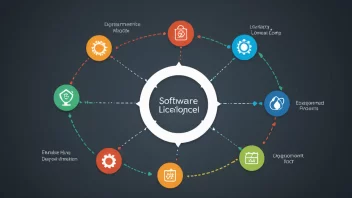The engineering landscape is constantly evolving, driven by rapid technological advancements and the urgent need to address global challenges. As industries transform, certain engineering fields have emerged as particularly promising, showcasing high demand and exciting opportunities for professionals. In this article, we will compare two of the most sought-after engineering disciplines today: Software Engineering and Civil Engineering. We will explore their pros, cons, and the unique roles they play in shaping our future.
Overview of Software Engineering
Software Engineering is the systematic application of engineering approaches to software development. This field is vital as it underpins almost all modern technologies, from mobile applications to complex systems controlling critical infrastructures.
Pros of Software Engineering
- High Demand: With the digital transformation of businesses, Software Engineers are in high demand across various industries.
- Flexibility: Many software development roles offer remote working opportunities, allowing for a better work-life balance.
- Competitive Salaries: Software Engineers typically earn attractive salaries, often enhanced by bonuses and stock options.
- Innovation: This field is at the forefront of technological advancements, providing opportunities to work on cutting-edge projects.
Cons of Software Engineering
- Continuous Learning: The rapid pace of technology means that Software Engineers must constantly update their skills.
- High Pressure: The demand for quick delivery can lead to intense work environments and burnout.
- Job Market Saturation: As more individuals enter the field, certain areas may become overcrowded.
Overview of Civil Engineering
Civil Engineering focuses on the design, construction, and maintenance of the physical and naturally built environment. This field encompasses a wide range of structures, including roads, bridges, dams, and buildings, making it crucial for national development.
Pros of Civil Engineering
- Job Stability: Civil Engineering roles are often tied to government projects, providing a level of job security.
- Impactful Work: Civil Engineers contribute directly to society by creating infrastructure that improves quality of life.
- Diverse Opportunities: The field includes various specializations, such as environmental, structural, and transportation engineering.
- Field Work: Many civil engineering roles involve outdoor work and hands-on project management.
Cons of Civil Engineering
- Longer Education Requirements: Civil Engineers typically need at least a bachelor’s degree and may require further certifications.
- Regulatory Challenges: Engineers must navigate complex regulations and standards, which can slow project timelines.
- Physical Labor: Some civil engineering roles may involve physically demanding work, particularly in construction settings.
Comparative Analysis
When comparing Software Engineering and Civil Engineering, several factors come into play, including job market trends, work environments, and educational paths. Understanding these elements can help prospective students and professionals make informed decisions about their careers.
Job Market Trends
The job market for Software Engineers is booming, with a projected growth rate of 22% from 2020 to 2030, which is significantly faster than average. This growth is fueled by the increasing reliance on technology across all sectors. In contrast, Civil Engineering is expected to grow at a rate of 8% during the same period, reflecting steady demand in infrastructure development and maintenance.
Work Environments
Software Engineers often work in collaborative, tech-driven environments that emphasize innovation and flexibility. Many companies adopt agile frameworks, allowing teams to adapt quickly to changing requirements. Conversely, Civil Engineers frequently split their time between office settings for design and planning and field sites for project management and oversight. This duality offers a mix of desk and hands-on work, appealing to those who thrive in dynamic environments.
Educational Paths
Both fields require a solid educational foundation, but the paths differ significantly. Software Engineering typically requires a degree in computer science or a related field, with additional certifications often beneficial. In contrast, Civil Engineering mandates a degree in civil engineering, which includes coursework in mathematics, physics, and materials science, alongside practical training through internships or co-op programs.
Final Thoughts
Choosing between Software Engineering and Civil Engineering ultimately depends on individual interests and career goals. Software Engineering offers rapid growth, high salaries, and the chance to work on innovative technologies, making it appealing for those passionate about coding and software solutions. Civil Engineering, however, provides stability, the ability to impact communities through infrastructure, and diverse career paths in various specializations.
For those looking for a fast-paced, tech-focused career, Software Engineering may be the better choice. Alternatively, individuals drawn to tangible results and societal contributions might find Civil Engineering more fulfilling. Both fields hold promising futures and play crucial roles in our increasingly complex world.






